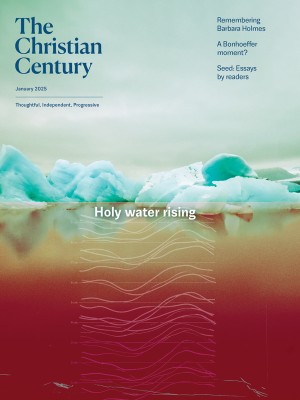January 6, Epiphany (Matthew 2:1-12)
You rarely see a children’s pageant based on Matthew’s story of escape from a raging despot.
It was the first Christmas break of the COVID pandemic, and I was desperate for new distractions for my young children. Why not celebrate Epiphany? We made paper crowns, baked and decorated a king cake, and gave small gifts on January 6. My children got so into the holiday that they put on a play, in costume, about the journey of the Magi, taking turns riding on a toy rocking horse and laughing hysterically.
You don’t usually see a children’s pageant about the complete Matthew 2 story—filled with fear, deception, and an escape from a raging despot. The visit of the Magi to the Christ Child isn’t really part of the Christmas story anyway, but a typical pageant inserts them briefly nonetheless: three kids in paper crowns and jewel-toned bathrobes carrying colorfully wrapped boxes.
Read our latest issue or browse back issues.
The pageants, including my kids’ impromptu performance, stop before Herod enters the scene. That’s a road we don’t want to travel. This part of the story exposes fear and conflict, which we’d rather avoid but which also show us the world as it is. We know fear, conflict, and loss because we’ve seen them along the journey of our lives.
I recall that first pandemic winter as a season of journeys and detours for many of us. We had one way of living, and the pandemic asked us—like the Magi of the Epiphany story—to take another road. Our family went for three years without seeing relatives out of state; my children were homeschooled for a year; a good friend lost his father to COVID. I imagine that the Magi neither expect to be on the road to Bethlehem in the first place nor anticipate a detour on the way home.
The writer of the Gospel of Matthew sets up two diverging roads when contrasting the brutal Herod the Great with the Magi, visitors from the East who were likely Zoroastrian astrologers. Herod is fearful; the Magi are faithful. Herod deceives to cling to power; the Magi bow before the young Jesus. Herod cannot find Jesus, who is right under his nose; the Magi locate him from afar through a heavenly sign. Herod is Rome’s client king; the Magi seek the true king.
This text is chosen for the feast of Epiphany, in part because of the revelation of Jesus’ birth to gentiles—in this case the astrologers from the East. An epiphany is a revealing, a manifestation, a sudden knowing. We might have an epiphany, a dazzling experience of God, in a way that’s predictable and expected—at worship, at a Bible camp, through a friend of deep faith—but we might also take a different road to Christ, as the Magi do. The Magi come to Jesus in a way that is outside the norm, beyond conventional understanding, outside the formulas for church growth and evangelism. Epiphany reminds us that God is available to all and is found along unexpected paths, including paths that we wouldn’t have taken or that make us uncomfortable.
There is more than one epiphany in this text. For the Magi, the star in the East reveals to them where they should go. Upon entering the house of Mary and Joseph, they see the child Jesus—another revealing. Finally, a dream reveals to them that they should not return to Herod, so they take another road home. You might also say Herod has an uncomfortable epiphany, one that takes him on a road of destruction in the massacre of the innocents (Luke 2:16).
For the Magi, these moments of epiphany take them on a journey: to the West, to a modest home, on a detour. Our ancestors of faith in the Old and New Testaments—Abraham, Moses, Mary, Paul—are called on literal or figurative journeys after surprising revelations from God.
The readings for the season of Epiphany feature stories in which God is made manifest in surprising and life-changing ways—the wedding at Cana, a miraculous catch of fish, the healing of the sick. These manifestations of God lead to some extraordinary journeys—the disciples drop their nets and follow Jesus, for instance. Might this Epiphany season invite us on a journey too? How might God reveal God’s self in an ordinary place in our lives? How might we be invited to go another way in a situation where we currently feel stuck? Might we find God in the detours, wrong turns, and changes of plans?
I don’t particularly like detours on my journeys, but I trust that God is found on those roads too. I was surprised to find out, that first pandemic winter, that I was carrying a third son in my womb—a future actor in the pageantry of our family. Sometimes we are invited on another road. With God, all those roads lead home.





